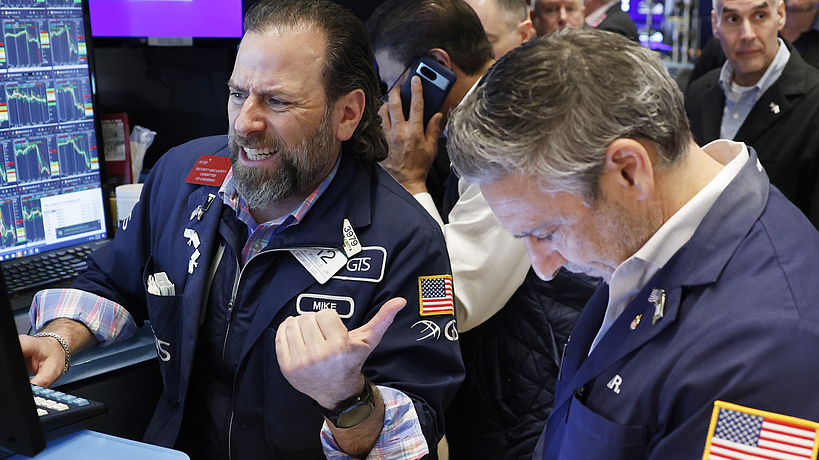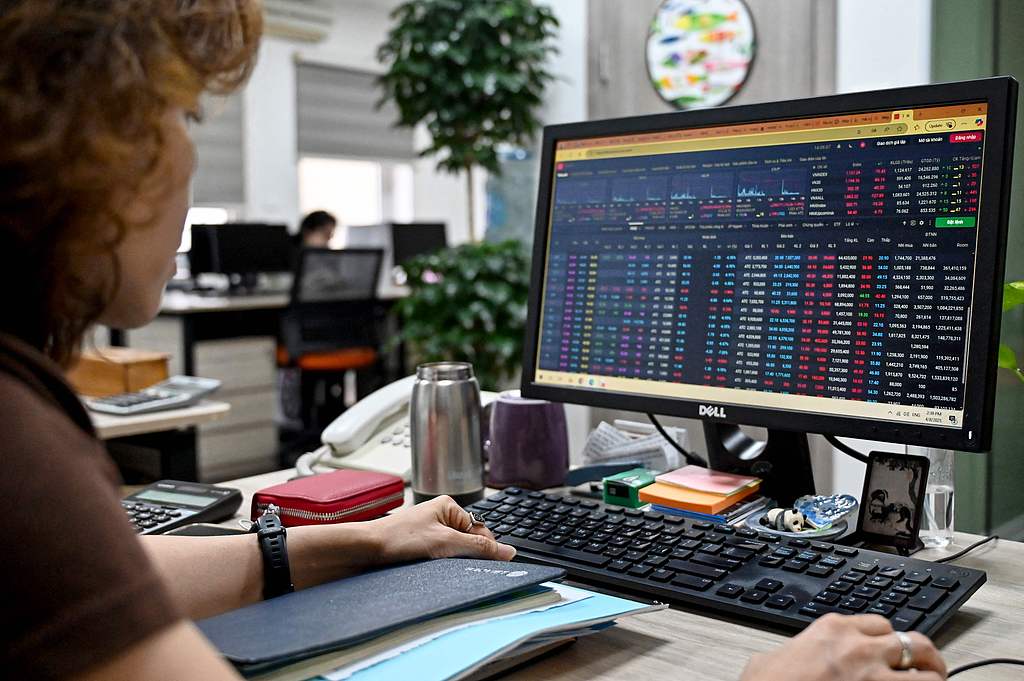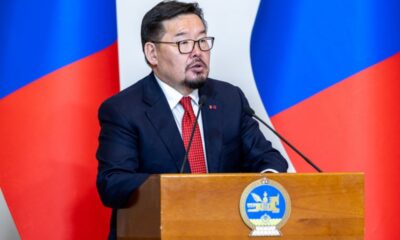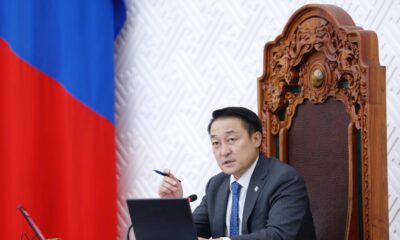Дэлхий дахинд
Хөлбөмбөгч тоглолтын үеэр ухаан алдаж, эсрэг багийн тоглогч амийг нь аварчээ

Өнгөрсөн бямба гаригт болсон “Евро 2020”-ийн урьдчилсан шатны Гүрж-Швейцарийн багийн тоглолтын үеэр эмгэнэлт явдал гарах шахжээ. Зочин багийн хамгаалагч Фабиан Шер тоглолтын үеэр ухаан алдаж, маш хүнд нөхцөлд орсон байна. Аз болж, эсрэг багийн тоглогч анхны тусламжийг зөв үзүүлснээр эсрэг багийн тоглогч амь насыг нь аварсан байна.
Фабиан Шер тоглолтын 23 дахь минутад Жемал Табидзетэй мөргөлдөж, газарт ухаангүй унасан аж. Түүний бүх бие нь мэдрэлгүй болсноос болж хэл нь унаж, хоолойгоо бөглөснийг тааварлах хүн байсангүй. Харин эсрэг багийн тоглогч Жано Ананидзе нөхцөл байдлыг түргэн зуурт зөв үнэлж, Фабианы амыг нээж, хэлийг нь татаж гарган амьсгалын замыг нь чөлөөлж өгснөөр амь насыг нь аварчээ. Үүний дараа эмч нар ирж Фабианд тусламж үзүүлсэн байна. Фабиан Шер сэргэж ухаан орсон төдийгүй тоглолтыг үргэлжлүүлж, дуустал нь тогложээ. Энэ тоглолтод Швейцарь 2:0-ээр хожиж, Фабиан Шер хоёр гоолд хоёуланд нь оролцсон байна. Харин тоглолтын гол баатар нь Жано Ананидзе байсан юм.

Швейцарийн хөлбөмбөгийн холбооны хэвлэлийн төлөөлөгч Марко фон Ах “Спорт-Экспресс”-т өгсөн тодруулгадаа “Шер одоо зүгээр. Ананидзегийн үзүүлсэн тусламж зөв байсан уу гэж үү. Мэдээж тийм. Манай эмч нар бидэнд энэ талаар тодорхой ярьсан. Өөр нь ч гэсэн хэлсэн гэсэн. Хэл нь роолойгоо бөгдлөж, амьсгалж чадахгүй болсон байсныг анзаарч, тусламж үзүүлсэн Жанод дахин баярлалаа гэж хэлье. Түүний хийснийг магтахгүй байхын аргагүй. Манай багийн тоглогчдын хэн нь ч ижил нөхцөл байдал үүссэн бол багийн нөхөртөө ч, эсрэг багийн тоглогчид ч туламж үзүүлэх байсан гэдэгт итгэлтэй байна. Харин Жано нөхцөл байдлыг бусдаас түрүүнд дүгнэж, түргэн хөдөлсөн. Манай баг сорилгын хүрээнд Гүржийн багтай дахин тоглох хуваарьтай байгаа. Тэр үед Гүржийн хөлбөмбөгийн холбоо бидний талархлыг зүй ёсоор хүртэх болно” гэж өгүүлсэн байна.


Дэлхий дахинд
Ромын пап Францисыг оршуулах ёслол бямба гарагт болно

Ромын католик сүм хийдийн кардиналууд өчигдөр хуралдаж, пап Францисын оршуулах ёслолыг энэ бямба гарагт Гэгээн Петрийн талбайд гадаа үйлдэхээр тогтжээ. Харин ард иргэд, сүсэгтнүүдийг Ромын Папд хүндэтгэлээ илэрхийлэх боломжийг олгох үүднээс лхагва гарагт шарилыг нь Гэгээн Петрийн сүмд байрлуулж юм байна.
88 настай Пап лам Францис тархинд нь цус харвасны улмаас зүрхний дутагдалд орж нас нөгчсөн болохыг Ватиканы албаныхан үүний өмнө мэдээлсэн. Он гарснаас хойш хоёр уушгиндаа хатгалгаа туссаны улмаас эмчлүүлж эмнэлгээс гараад удаагүй байсан Ромын пап хамгийн сүүлд өнгөрсөн амралтын өдөр Улаан өндөгний баярыг тохиолдуулж Гэгээн Петрийн талбайд сүсэгтэн олонтой мэндчилж байсан юм. Францис ламтан мөн тогтсон заншлаас гажиж, Гэгээн Петрийн сүмд бус, Гэгээн Мариагийн сүмд өөрийг нь оршуулахыг гэрээсэлжээ. Өмнөх бүх Ромын папуудаас анх удаа Европын бус орны гаралтай Францис ламтны дурсгалыг хүндэтгэж төрөлх Аргентин улсад нь болон хөрш Бразил улсад 7 хоногийн гашуудал зарласан байна.Мөн дэлхийн католик шашинтнуудын тэргүүнийг оршуулах ёслолд оролцож, Пап Францистай салах ёс гүйцэтгэх бодолтой байгаагаа дэлхийн олон орны удирдагчид илэрхийлж байгаа юм байна.
АНУ-ын Ерөнхийлөгч Д.Трамп тухайлбал гэргийн хамтаар Ром хотноо энэ ёслолд оролцохоо мэдэгдсэнээр албандаа орсноосоо хойш анх удаа хилийн дээс алхах гэж байгааг хэвлэлүүд дурьдаж байна. Францын Ерөнхийлөгч Э.Макрон, Бразилийн ерөнхийлөгч Лула да Сильва, Пап ламтны төрөлх Аргентин улсын ерөнхийлөгч Хавьер Милей нар мөн оршуулгад оролцохоо мэдэгджээ. Украины ерөнхийлөгч Зеленский очихоор төлөвлөж байгаа талаар дотоодын хэвлэлүүд нь мэдээлжээ.
Дэлхийн 1,4 тэрбум католик шашинтнуудын тэргүүн, дараагийн Пап ламыг сонгох сонгуулийн тухайд, түүнийг таалал төгссөнөөс 15-20 хоногийн дараа эхэлдэг жаягтай. Энэ үүднээсээ тавдугаар сарын 6-наас хойш болох юм байна. Маш чанд хатуу дэг ёсны дагуу, нууц байдалд явагддаг энэ сонгуульд дэлхийн өнцөг булан бүрийн 135 кардинал оролцох эрхтэй байна.
Дэлхий дахинд
The U.S. tariff tantrum: A self-defeating trade war

Editor’s note: Xin Ping is a commentator on international affairs, writing regularly for Xinhua News Agency, CGTN, Global Times, China Daily, etc. The article reflects the author’s views and not necessarily those of CGTN.
Washington’s latest tariff blitzkrieg – slapping “universal” levies on over 180 nations and regions – is setting things on fire at home.
The moment the executive order was signed, U.S. markets went into freefall: the Dow plunged nearly 4 percent, Apple and Nike stocks nosedived, and $6.4 trillion vanished from Wall Street in two days.
This isn’t economic policy. It’s economic arson.
The art of self-sabotage
Will tariffs bring manufacturing home? Despite years of arm-twisting, American tech giant Apple still works with 94.5 percent of its suppliers being overseas.
Apple isn’t an outlier. The semiconductor industry is facing obstacles in reshoring back to the U.S. as well. Intel has paused its Arizona factory. TSMC is delaying U.S. production. The problems hindering “made in America” are systemic and may only be addressed through a broad and profound economic restructuring. Tariffs won’t magically resurrect dead industries; they only inflate prices for already-struggling consumers.
The U.S. tariff spree, unleashed in the name of “America First,” is in fact a masterclass in shooting oneself in the foot. U.S. farmers will be hard hit. In the aftermath of the 2018 China tariff, while U.S. soybean exports eventually rebounded, the farming community suffered irreparable damages: Midwest farm bankruptcies spiked 30 percent, wiping out generations of family farms. Today’s “Tariff 2.0” risks repeating history – but with higher stakes.
China’s counterpunch
Beijing has been defending itself with precise actions, hitting back with matching levies. But its market remains open to others. Germany’s automakers, for instance, now sell more cars in China than at home. ASEAN’s durians and lobsters enter Chinese markets tariff-free under RCEP – a stark contrast to America’s “walled garden” approach.
As China’s commerce ministry stated: “Bullying tactics won’t work. We defend rules, not whims.” Similar tactics have failed before. When the U.S. tried weaponizing small-parcel exemptions to target Chinese goods, U.S. retailers revolted, as 60 percent of affected imports are everyday essentials for low-income households.
Allies: from partners to prey
American allies are not spared either, and their response has also been strong. The EU is poised to approve retaliatory measures. France is warning against “suicidal trade wars.” German industries are lobbying Brussels to hit back harder. Japan is calling the moves “deeply regrettable.”
In Southeast Asia, the irony is thicker than durian pulp as countries like Vietnam face 46 percent tariffs but remain trapped supplying components to U.S. tech giants. An economist in Hanoi reveals the reality: “Trump wants us to be his factory, but not his competitor. That math doesn’t add up.”
The U.S. tariff crusade isn’t just failing – it’s uniting the Global South against Washington. The U.S. only accounts for around 15 percent of global trade. The remaining 85 percent is made up by the rest of the world – including China – and it will not stand idly by and watch the international trade system, the very thing that fostered global prosperity for decades, destroyed by self-serving political motivations.

A woman looks at an electronic stockboard on her computer at a trading company in Hanoi, Vietnam on April 8, 2025. /CFP
The ghost of Smoot-Hawley
History has long given its verdict on tariffs. The 1930 Smoot-Hawley tariffs turned a recession into the Great Depression. The déjà vu is uncanny: U.S. steel tariffs briefly boosted producers but killed 75,000 downstream jobs. American icon motorcycle manufacturer Harley-Davidson was forced to shift production overseas to avoid costs. “Made in America” has become “priced out of America.”
Those in Washington are preaching “short-term pain for long-term gain.” Tell that to the 27 U.S. textile mills shut down in the past 20 months, or the single mom paying 17 percent more for Walmart clothes. Some on Reddit have put it quite well: “Tariffs are taxes on the poor.”
Epilogue: The unlearned lesson
The White House insists this is “historic” – and they’re right. Not since the 1930s has the U.S. so recklessly weaponized trade. But the world has changed: China is deeply integrated into global supply chains, the EU makes its own decisions, and ASEAN won’t ditch prosperity for geopolitics.
The clock is ticking. Every tariff tweet coming from Washington is shredding U.S. credibility. Every market plunge erodes the White House’s “strong economy” narrative. And America’s isolation deepens with every trade deal other countries make on lowered tariffs, such as those between China and ASEAN and European countries.
In the end, it’s not just about the economy. America is turning its back on the world. The path it has chosen is a solitary one.
(If you want to contribute and have specific expertise, please contact us at opinions@cgtn.com. Follow @thouse_opinions on X, formerly Twitter, to discover the latest commentaries in the CGTN Opinion Section.)
Дэлхий дахинд
БНСУ даяар галын нөхцөл байдал ноцтой түвшинд хүрснийг зарлалаа

-

 Нийгэм3 цаг өмнө
Нийгэм3 цаг өмнөТээврийн хэрэгсэл бүлэглэн хулгайлсан хэргийг илрүүллээ
-

 Нийгэм5 цаг өмнө
Нийгэм5 цаг өмнөЭлсэлтийн шалгалт өнөөдөр эхэлнэ
-

 Нийгэм5 цаг өмнө
Нийгэм5 цаг өмнөЗам тээврийн ослын улмаас нэг хүний амь нас хохирчээ
-

 Улс төр5 цаг өмнө
Улс төр5 цаг өмнөМонгол Улсын Ерөнхий сайд Г.Занданшатар Засгийн газрын гишүүдээ томиллоо
-

 Улс төр4 цаг өмнө
Улс төр4 цаг өмнөД.Амарбаясгалан: Төрийн бизнес данхайдаг биш, харин иргэдийн бизнес нь цэцэглэдэг эрх зүйн шинэтгэлийн бодлого боловсруулж, шуурхай оруулж ирэх хэрэгтэй
-

 Энтертайнмент4 цаг өмнө
Энтертайнмент4 цаг өмнөҮндэсний шигшээ багийн тамирчид 2025 оны эхний зургаан сарын байдлаар 90 медаль хүртээд байна
-

 Нийгэм3 цаг өмнө
Нийгэм3 цаг өмнөСХД-ийн спорт цогцолборын барилгын ажил 90 хувьтай үргэлжилж байна















































































